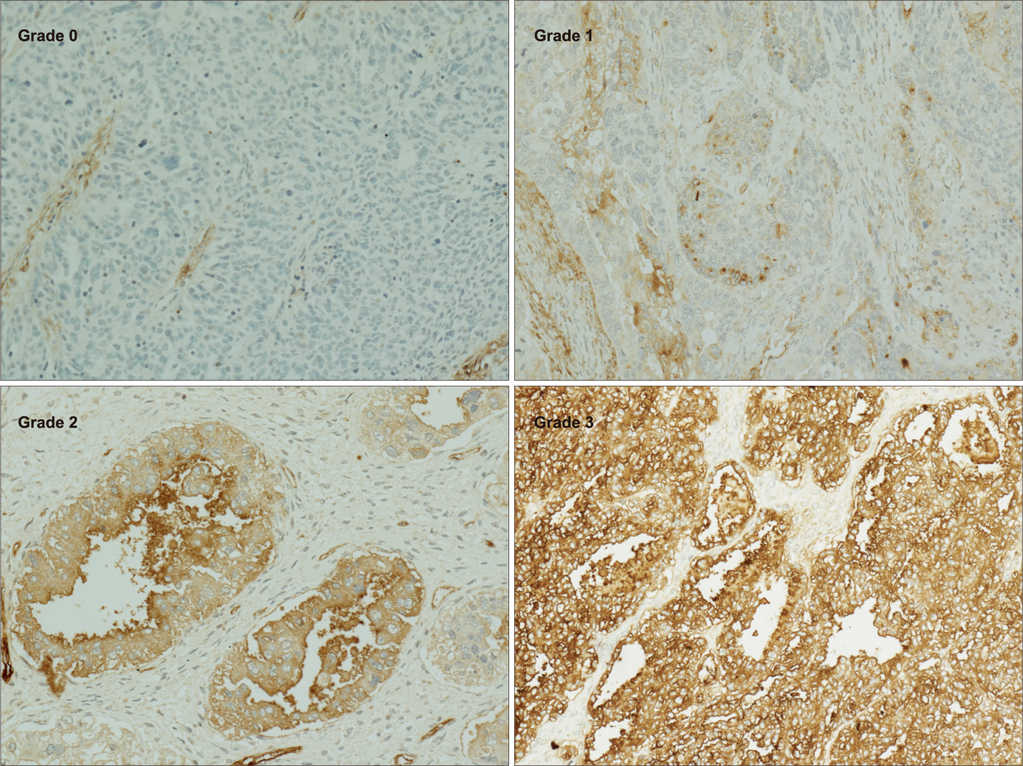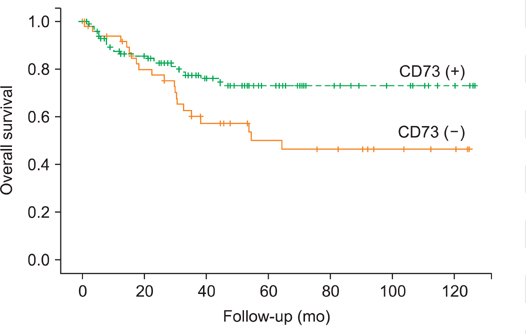J Gynecol Oncol.
2012 Oct;23(4):274-281. 10.3802/jgo.2012.23.4.274.
Overexpression of CD73 in epithelial ovarian carcinoma is associated with better prognosis, lower stage, better differentiation and lower regulatory T cell infiltration
- Affiliations
-
- 1Department of Pathology, Catholic University of Daegu School of Medicine, Daegu, Korea.
- 2Department of Microbiology, Kangwon National University School of Medicine, Chuncheon, Korea.
- 3Department of Molecular Biology, College of Pharmacy and Life & Nanopharmaceutical Science, Kyung Hee University, Seoul, Korea.
- 4Department of Obstetrics and Gynecology, Catholic University of Daegu School of Medicine, Daegu, Korea. drcys@cu.ac.kr
- KMID: 1810125
- DOI: http://doi.org/10.3802/jgo.2012.23.4.274
Abstract
OBJECTIVE
The purpose of the current study was to evaluate survival outcome according to the expression status of CD73 in patients with epithelial ovarian cancer.
METHODS
A total of 167 patients with epithelial ovarian cancer were enrolled in the current study. For each patient, a retrospective review of medical records was conducted. Immunohistochemical staining for CD73, CD8, FoxP3, and CD68 was performed using tissue microarray made with paraffin embedded tissue block.
RESULTS
Among the enrolled patients, 29.9% of patients (n=50) showed negative expression for CD73, whereas 70.1% of patients (n=117) showed positive expression for CD73. The CD73 positive group showed better prognosis compared to the CD73 negative group (5-year overall survival of CD73 positive group, 73.0%; that of CD73 negative group, 50.1%; p=0.023). CD73 was more frequently expressed in mucinous adenocarcinoma and clear cell carcinoma compared to serous or endometrioid adenocarcinoma. In addition, CD73 overexpressions were more frequently detected in patients with known good prognostic factors, i.e., low stage, well/moderate differentiation, negative peritoneal cytology, no lymphovascular involvement, and no macroscopic residual tumor after debulking surgery. There was significantly more infiltration of regulatory T cells in the CD73 negative group compared to the CD73 positive group.
CONCLUSION
Good prognosis in patients with overexpression of CD73 may be due to that overexpression of CD73 was more frequently observed in epithelial ovarian cancer patients with known good prognostic factors. Therefore, this result means that favorable differentiation and stage have more influence on survival outcome than adverse effect of CD73 per se.
Keyword
MeSH Terms
Figure
Reference
-
1. Adams SF, Levine DA, Cadungog MG, Hammond R, Facciabene A, Olvera N, et al. Intraepithelial T cells and tumor proliferation: impact on the benefit from surgical cytoreduction in advanced serous ovarian cancer. Cancer. 2009. 115:2891–2902.2. Clarke B, Tinker AV, Lee CH, Subramanian S, van de Rijn M, Turbin D, et al. Intraepithelial T cells and prognosis in ovarian carcinoma: novel associations with stage, tumor type, and BRCA1 loss. Mod Pathol. 2009. 22:393–402.3. Sato E, Olson SH, Ahn J, Bundy B, Nishikawa H, Qian F, et al. Intraepithelial CD8+ tumor-infiltrating lymphocytes and a high CD8+/regulatory T cell ratio are associated with favorable prognosis in ovarian cancer. Proc Natl Acad Sci U S A. 2005. 102:18538–18543.4. Stumpf M, Hasenburg A, Riener MO, Jutting U, Wang C, Shen Y, et al. Intraepithelial CD8-positive T lymphocytes predict survival for patients with serous stage III ovarian carcinomas: relevance of clonal selection of T lymphocytes. Br J Cancer. 2009. 101:1513–1521.5. Curiel TJ, Coukos G, Zou L, Alvarez X, Cheng P, Mottram P, et al. Specific recruitment of regulatory T cells in ovarian carcinoma fosters immune privilege and predicts reduced survival. Nat Med. 2004. 10:942–949.6. Woo EY, Chu CS, Goletz TJ, Schlienger K, Yeh H, Coukos G, et al. Regulatory CD4(+)CD25(+) T cells in tumors from patients with early-stage non-small cell lung cancer and late-stage ovarian cancer. Cancer Res. 2001. 61:4766–4772.7. Kryczek I, Wei S, Zhu G, Myers L, Mottram P, Cheng P, et al. Relationship between B7-H4, regulatory T cells, and patient outcome in human ovarian carcinoma. Cancer Res. 2007. 67:8900–8905.8. Aoki Y, Takakuwa K, Kodama S, Tanaka K, Takahashi M, Tokunaga A, et al. Use of adoptive transfer of tumorinfiltrating lymphocytes alone or in combination with cisplatin-containing chemotherapy in patients with epithelial ovarian cancer. Cancer Res. 1991. 51:1934–1939.9. Edwards RP, Gooding W, Lembersky BC, Colonello K, Hammond R, Paradise C, et al. Comparison of toxicity and survival following intraperitoneal recombinant interleukin-2 for persistent ovarian cancer after platinum: twenty-four-hour versus 7-day infusion. J Clin Oncol. 1997. 15:3399–3407.10. Gulley JL, Arlen PM, Tsang KY, Yokokawa J, Palena C, Poole DJ, et al. Pilot study of vaccination with recombinant CEAMUC-1-TRICOM poxviral-based vaccines in patients with metastatic carcinoma. Clin Cancer Res. 2008. 14:3060–3069.11. Hodi FS, Butler M, Oble DA, Seiden MV, Haluska FG, Kruse A, et al. Immunologic and clinical effects of antibody blockade of cytotoxic T lymphocyte-associated antigen 4 in previously vaccinated cancer patients. Proc Natl Acad Sci U S A. 2008. 105:3005–3010.12. Reinartz S, Kohler S, Schlebusch H, Krista K, Giffels P, Renke K, et al. Vaccination of patients with advanced ovarian carcinoma with the anti-idiotype ACA125: immunological response and survival (phase Ib/II). Clin Cancer Res. 2004. 10:1580–1587.13. Vlad AM, Budiu RA, Lenzner DE, Wang Y, Thaller JA, Colonello K, et al. A phase II trial of intraperitoneal interleukin-2 in patients with platinum-resistant or platinumrefractory ovarian cancer. Cancer Immunol Immunother. 2010. 59:293–301.14. Gajewski TF, Meng Y, Harlin H. Immune suppression in the tumor microenvironment. J Immunother. 2006. 29:233–240.15. Gabrilovich DI, Chen HL, Girgis KR, Cunningham HT, Meny GM, Nadaf S, et al. Production of vascular endothelial growth factor by human tumors inhibits the functional maturation of dendritic cells. Nat Med. 1996. 2:1096–1103.16. Colgan SP, Eltzschig HK, Eckle T, Thompson LF. Physiological roles for ecto-5'-nucleotidase (CD73). Purinergic Signal. 2006. 2:351–360.17. Resta R, Yamashita Y, Thompson LF. Ecto-enzyme and signaling functions of lymphocyte CD73. Immunol Rev. 1998. 161:95–109.18. Hoskin DW, Mader JS, Furlong SJ, Conrad DM, Blay J. Inhibition of T cell and natural killer cell function by adenosine and its contribution to immune evasion by tumor cells (Review). Int J Oncol. 2008. 32:527–535.19. Spychala J. Tumor-promoting functions of adenosine. Pharmacol Ther. 2000. 87:161–173.20. Wang L, Zhou X, Zhou T, Ma D, Chen S, Zhi X, et al. Ecto-5'-nucleotidase promotes invasion, migration and adhesion of human breast cancer cells. J Cancer Res Clin Oncol. 2008. 134:365–372.21. Jin D, Fan J, Wang L, Thompson LF, Liu A, Daniel BJ, et al. CD73 on tumor cells impairs antitumor T-cell responses: a novel mechanism of tumor-induced immune suppression. Cancer Res. 2010. 70:2245–2255.22. Rackley RR, Lewis TJ, Preston EM, Delmoro CM, Bradley EL Jr, Resnick MI, et al. 5'-nucleotidase activity in prostatic carcinoma and benign prostatic hyperplasia. Cancer Res. 1989. 49:3702–3707.23. Leffers N, Gooden MJ, de Jong RA, Hoogeboom BN, ten Hoor KA, Hollema H, et al. Prognostic significance of tumor-infiltrating T-lymphocytes in primary and metastatic lesions of advanced stage ovarian cancer. Cancer Immunol Immunother. 2009. 58:449–459.
- Full Text Links
- Actions
-
Cited
- CITED
-
- Close
- Share
- Similar articles
-
- Preoperative serum levels of cancer antigen 125 and carcinoembryonic antigen ratio can improve differentiation between mucinous ovarian carcinoma and other epithelial ovarian carcinomas
- Expression of c-Met in ovarian epithelial tumor
- A Case of Primary Peritoneal Carcinoma
- Alteration of G1/S Cell Cycle Regulatory Proteins in Ovarian Epithelial Tumors
- Ovarian Squamous Cell Carcinoma Associated with Endometriosis: Poor Response to Chemotherapy



